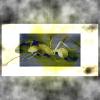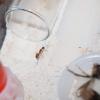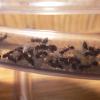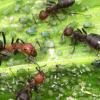- Formiculture.com
- Forums
- Gallery
- Members
- Member Map
- Chat

OhNoNotAgain's Tetramorium Attack on Titan... REBOOTING? OH NO, NOT AGAIN
Started By
OhNoNotAgain
, Jan 29 2020 6:43 AM
79 replies to this topic
#61
 Offline
-
Posted May 2 2021 - 2:49 AM
Offline
-
Posted May 2 2021 - 2:49 AM
Ouch! Those AntWorldUSA nests are awful, sounds like. Sorry.
"The ants are a people not strong, yet they prepare their meat in the summer." Prov. 30:25
Keep ordinary ants in extraordinary ways.
Keep ordinary ants in extraordinary ways.
#62
 Offline
-
Posted May 2 2021 - 9:45 AM
Offline
-
Posted May 2 2021 - 9:45 AM
Ouch! Those AntWorldUSA nests are awful, sounds like. Sorry.
Oh no, they aren't bad - just the Tetra are so darn small any imperfection or bad placement in lid and box fit they can get out.
It's just around the lip of the outworld that's the problem. Everything else is sealed really tightly.
So the one major drawback, in fact, is it's sealed so well that you can't clean the nest. That's really my main complaint.
My life right now has some major stuff going on so it's been hard for me to keep up with the barrier (mineral oil) maintenance.
Formiculture Journals::
Veromessor pergandei, andrei; Novomessor cockerelli
Camponotus fragilis; also separate journal: Camponotus sansabeanus (inactive), vicinus, laevigatus/quercicola
Liometopum occidentale; Prenolepis imparis; Myrmecocystus mexicanus (inactive)
Pogonomyrmex subnitidus and californicus (inactive)
Tetramorium sp.
Termites: Zootermopsis angusticollis
Isopods: A. gestroi, granulatum, kluugi, maculatum, vulgare; C. murina; P. hoffmannseggi, P. haasi, P. ornatus; V. parvus
Spoods: Phidippus sp.
#63
 Offline
-
Posted May 2 2021 - 10:54 AM
Offline
-
Posted May 2 2021 - 10:54 AM
Can you set their formicarium over a little tray filled with water? You’d have to keep on top of refilling it, but that would 100% prevent anything like this happening again.
"The ants are a people not strong, yet they prepare their meat in the summer." Prov. 30:25
Keep ordinary ants in extraordinary ways.
Keep ordinary ants in extraordinary ways.
#64
 Offline
-
Posted May 27 2021 - 8:19 PM
Offline
-
Posted May 27 2021 - 8:19 PM
Oooooooops. So I had been ignoring the Tetras aside from dropping in fruit flies…. I guess still annoyed at what they did to my other colonies. Today I saw a bunch trying to escape and it turns out… they were out of water. Looks like I lost most of the workforce again (it’s happened before in this journal). We’ll see what happens!
- Antkeeper01 likes this
Formiculture Journals::
Veromessor pergandei, andrei; Novomessor cockerelli
Camponotus fragilis; also separate journal: Camponotus sansabeanus (inactive), vicinus, laevigatus/quercicola
Liometopum occidentale; Prenolepis imparis; Myrmecocystus mexicanus (inactive)
Pogonomyrmex subnitidus and californicus (inactive)
Tetramorium sp.
Termites: Zootermopsis angusticollis
Isopods: A. gestroi, granulatum, kluugi, maculatum, vulgare; C. murina; P. hoffmannseggi, P. haasi, P. ornatus; V. parvus
Spoods: Phidippus sp.
#65
 Offline
-
Posted August 26 2021 - 8:26 PM
Offline
-
Posted August 26 2021 - 8:26 PM
They are constantly trying to escape and I need to oil the walls. Their nest is so gross I can't see a thing inside.
I need to seriously clean their world but it's very hard to do.
- Antkeeper01 likes this
Formiculture Journals::
Veromessor pergandei, andrei; Novomessor cockerelli
Camponotus fragilis; also separate journal: Camponotus sansabeanus (inactive), vicinus, laevigatus/quercicola
Liometopum occidentale; Prenolepis imparis; Myrmecocystus mexicanus (inactive)
Pogonomyrmex subnitidus and californicus (inactive)
Tetramorium sp.
Termites: Zootermopsis angusticollis
Isopods: A. gestroi, granulatum, kluugi, maculatum, vulgare; C. murina; P. hoffmannseggi, P. haasi, P. ornatus; V. parvus
Spoods: Phidippus sp.
#66
 Offline
-
Posted January 23 2022 - 12:31 PM
Offline
-
Posted January 23 2022 - 12:31 PM
Update
#67
 Offline
-
Posted March 27 2022 - 9:39 PM
Offline
-
Posted March 27 2022 - 9:39 PM
The Tertramorium I believe perished in the garage over the winter. To be honest I am relieved. They really escaped easily and they wreaked havoc and killed off struggling colonies… not by killing queens, but by offing workers. Their toxin seemed to have a delayed but lethal effect on their foes.
I do not plan on getting more Tetramorium!!
I do not plan on getting more Tetramorium!!
Formiculture Journals::
Veromessor pergandei, andrei; Novomessor cockerelli
Camponotus fragilis; also separate journal: Camponotus sansabeanus (inactive), vicinus, laevigatus/quercicola
Liometopum occidentale; Prenolepis imparis; Myrmecocystus mexicanus (inactive)
Pogonomyrmex subnitidus and californicus (inactive)
Tetramorium sp.
Termites: Zootermopsis angusticollis
Isopods: A. gestroi, granulatum, kluugi, maculatum, vulgare; C. murina; P. hoffmannseggi, P. haasi, P. ornatus; V. parvus
Spoods: Phidippus sp.
#68
 Offline
-
Posted March 28 2022 - 2:06 AM
Offline
-
Posted March 28 2022 - 2:06 AM
RIP
- OhNoNotAgain likes this
"The ants are a people not strong, yet they prepare their meat in the summer." Prov. 30:25
Keep ordinary ants in extraordinary ways.
Keep ordinary ants in extraordinary ways.
#69
 Offline
-
Posted March 30 2022 - 4:34 PM
Offline
-
Posted March 30 2022 - 4:34 PM
The Tertramorium I believe perished in the garage over the winter. To be honest I am relieved. They really escaped easily and they wreaked havoc and killed off struggling colonies… not by killing queens, but by offing workers. Their toxin seemed to have a delayed but lethal effect on their foes.
I do not plan on getting more Tetramorium!!
Well if you aren't going to get more Tetramorium immigrans then I will! Seem like fun and I have the perfect escape proof nest.
#70
 Offline
-
Posted August 11 2024 - 10:07 PM
Offline
-
Posted August 11 2024 - 10:07 PM
Well, I had an incident this year.
I found some queens flying in the front yard, so naturally I got excited and caught a bunch.
Until I got them ID'ed as ... Tetramorium.
Let's just say I have a Pleo of Doom Tube of Tetramorium and I still don't know what I want to do with them.
Thankfully (??) the 7 queens have been culled down into 1-2 surviving queens of a horde of tiny annoying ants.
P.S. I just heard that Tetramorium workers can live for years. Really? Is this true? YEARS??
Yeah anyone have suggestions for a solid nest for Tetra? I have used different types before, including mini-hearth (they escaped by wedging sand under the glass). At this point I just am not excited about keeping Tetramorium and want a realllllyyyyy escape-proof container.
Edited by OhNoNotAgain, August 11 2024 - 10:12 PM.
- RushmoreAnts, Ants_Dakota and bmb1bee like this
Formiculture Journals::
Veromessor pergandei, andrei; Novomessor cockerelli
Camponotus fragilis; also separate journal: Camponotus sansabeanus (inactive), vicinus, laevigatus/quercicola
Liometopum occidentale; Prenolepis imparis; Myrmecocystus mexicanus (inactive)
Pogonomyrmex subnitidus and californicus (inactive)
Tetramorium sp.
Termites: Zootermopsis angusticollis
Isopods: A. gestroi, granulatum, kluugi, maculatum, vulgare; C. murina; P. hoffmannseggi, P. haasi, P. ornatus; V. parvus
Spoods: Phidippus sp.
#71
 Offline
-
Posted August 11 2024 - 10:23 PM
Offline
-
Posted August 11 2024 - 10:23 PM
The only foolproof “formicarium” I can think of is a tubs and tubes setup with a really tight fitting lid lol.
- RushmoreAnts and OhNoNotAgain like this
"Float like a butterfly sting like a bee, his eyes can't hit what the eyes can't see."
- Muhammad Ali
Check out my shop and cryptic ant journal! Discord user is bmb1bee if you'd like to chat.
Also check out my YouTube channel: @bmb1bee
#72
 Offline
-
Posted August 12 2024 - 5:44 AM
Offline
-
Posted August 12 2024 - 5:44 AM
P.S. I just heard that Tetramorium workers can live for years. Really? Is this true? YEARS??
Indeed, any ant workers can live for years if not in constant danger and performing strenuous tasks. The couple months estimate is based on wild workers who die all the time and are overworked and underfed. Captive workers get to sit around all day in no danger and their tasks are all 5 times easier. Queens are of the same species, made of the same stuff, and they can last for 10+ years. Workers only die young due to predation and life stressors.
- Ants_Dakota likes this
"God made..... all the creatures that move along the ground according to their kinds (including ants). And God saw that it was good. Genesis 1:25 NIV version
Keeping:
Formica cf. pallidefulva, cf. incerta, cf. argentea
Formica cf. aserva, cf. subintegra
Myrmica sp.
Lasius neoniger, brevicornis
#73
 Offline
-
Posted August 12 2024 - 6:58 AM
Offline
-
Posted August 12 2024 - 6:58 AM
Well, I had an incident this year.
I found some queens flying in the front yard, so naturally I got excited and caught a bunch.
Until I got them ID'ed as ... Tetramorium.
Let's just say I have a Pleo of Doom Tube of Tetramorium and I still don't know what I want to do with them.
Thankfully (??) the 7 queens have been culled down into 1-2 surviving queens of a horde of tiny annoying ants.
P.S. I just heard that Tetramorium workers can live for years. Really? Is this true? YEARS??
Yeah anyone have suggestions for a solid nest for Tetra? I have used different types before, including mini-hearth (they escaped by wedging sand under the glass). At this point, I just am not excited about keeping Tetramorium and want a realllllyyyyy escape-proof container.
As mentioned above by ANTdrew, tetramorium do like the tubs and tubes setup, so you could think about housing them in this one from por amor art. I have had good success with these, they are affordable, and most importantly for you, the connections here are really well designed. I have a lasius neoniger group colony in there, whose workers are very close to the size of tetramorium(and far better climbers) and have not had any escapes from them. That said, I currently use a custom outworld I designed myself, so I am unsure how good por amor's outworlds are. I think the only downside would be that you might need to keep the holes for the 2nd and 3rd test tubes stuffed with cotton when the colony is founding so as not to have too many empty test tubes that consequently become trash dumps. As following the entire theme of this journal, Tetramorium will probably try to escape out of those...
Edited by Ants_Dakota, August 12 2024 - 6:59 AM.
- ANTdrew and RushmoreAnts like this
Go to the ant, you sluggard; consider its ways and be wise! It has no commander, no overseer or ruler, yet it stores its provisions in summer and gathers its food at harvest. -Proverbs 6: 6-8
My Ant Shop Here I have PPQ-526 permits to ship ants nationwide
Attention Ant-Keepers in South Dakota! Join the SoDak(Society Of Dakotan Ant Keepers)
#74
 Offline
-
Posted August 13 2024 - 2:40 PM
Offline
-
Posted August 13 2024 - 2:40 PM
Hmm, maybe my poor workers are just stressed out, but my Camponotus and Veromessor seem to die after a year. Meaning, I have to replenish them each year with a new "crop," or their numbers drop drastically by the same time the next year. For example, the first year I put my Veromessor into their Labyrinth, they were overflowing the nest and living in the outworld (and I think most of them were new crop workers). The next year, I was late giving them heat and the workers filled only half the nest. So I'd guess they had a population drop of about 2/3. Certain of my Camponotus also seem to have big die-offs every year.
(But on the topic of stressed out workers, I also remember reading sugar water is necessary for longevity for some species or other, and I admit I sometimes have let it run out and it may take a week or two before I refill....)
P.S. I just heard that Tetramorium workers can live for years. Really? Is this true? YEARS??
Indeed, any ant workers can live for years if not in constant danger and performing strenuous tasks. The couple months estimate is based on wild workers who die all the time and are overworked and underfed. Captive workers get to sit around all day in no danger and their tasks are all 5 times easier. Queens are of the same species, made of the same stuff, and they can last for 10+ years. Workers only die young due to predation and life stressors.
Edited by OhNoNotAgain, August 13 2024 - 2:41 PM.
Formiculture Journals::
Veromessor pergandei, andrei; Novomessor cockerelli
Camponotus fragilis; also separate journal: Camponotus sansabeanus (inactive), vicinus, laevigatus/quercicola
Liometopum occidentale; Prenolepis imparis; Myrmecocystus mexicanus (inactive)
Pogonomyrmex subnitidus and californicus (inactive)
Tetramorium sp.
Termites: Zootermopsis angusticollis
Isopods: A. gestroi, granulatum, kluugi, maculatum, vulgare; C. murina; P. hoffmannseggi, P. haasi, P. ornatus; V. parvus
Spoods: Phidippus sp.
#75
 Offline
-
Posted August 13 2024 - 2:47 PM
Offline
-
Posted August 13 2024 - 2:47 PM
Hmm, maybe my poor workers are just stressed out, but my Camponotus and Veromessor seem to die after a year. Meaning, I have to replenish them each year with a new "crop," or their numbers drop drastically by the same time the next year. For example, the first year I put my Veromessor into their Labyrinth, they were overflowing the nest and living in the outworld (and I think most of them were new crop workers). The next year, I was late giving them heat and the workers filled only half the nest. So I'd guess they had a population drop of about 2/3. Certain of my Camponotus also seem to have big die-offs every year.
(But on the topic of stressed out workers, I also remember reading sugar water is necessary for longevity for some species or other, and I admit I sometimes have let it run out and it may take a week or two before I refill....)
P.S. I just heard that Tetramorium workers can live for years. Really? Is this true? YEARS??
Indeed, any ant workers can live for years if not in constant danger and performing strenuous tasks. The couple months estimate is based on wild workers who die all the time and are overworked and underfed. Captive workers get to sit around all day in no danger and their tasks are all 5 times easier. Queens are of the same species, made of the same stuff, and they can last for 10+ years. Workers only die young due to predation and life stressors.
Yeah if your colony is having large-scale die-offs it's probably from the reasons you mentioned and not age.
"God made..... all the creatures that move along the ground according to their kinds (including ants). And God saw that it was good. Genesis 1:25 NIV version
Keeping:
Formica cf. pallidefulva, cf. incerta, cf. argentea
Formica cf. aserva, cf. subintegra
Myrmica sp.
Lasius neoniger, brevicornis
#76
 Offline
-
Posted August 13 2024 - 3:59 PM
Offline
-
Posted August 13 2024 - 3:59 PM
To clarify, it IS age-related - it's not like tons of workers die across the board (as happens with accidental dehydration, been there done that), it's just the older ones at about the one year mark. The colony always maintains a reasonable number of workers and the nurseries are always well-staffed. OTOH I do like their numbers staying steady - I don't have room to continually upgrade their nests to larger sizes. I call it "bonsai"ing my colonies (and the large ones are from 2019-2020 so 4 years old).
Yeah if your colony is having large-scale die-offs it's probably from the reasons you mentioned and not age.
Edited by OhNoNotAgain, August 13 2024 - 9:54 PM.
- RushmoreAnts likes this
Formiculture Journals::
Veromessor pergandei, andrei; Novomessor cockerelli
Camponotus fragilis; also separate journal: Camponotus sansabeanus (inactive), vicinus, laevigatus/quercicola
Liometopum occidentale; Prenolepis imparis; Myrmecocystus mexicanus (inactive)
Pogonomyrmex subnitidus and californicus (inactive)
Tetramorium sp.
Termites: Zootermopsis angusticollis
Isopods: A. gestroi, granulatum, kluugi, maculatum, vulgare; C. murina; P. hoffmannseggi, P. haasi, P. ornatus; V. parvus
Spoods: Phidippus sp.
#77
 Offline
-
Posted August 13 2024 - 5:45 PM
Offline
-
Posted August 13 2024 - 5:45 PM
Yah, good idea, especially if you don't want numbers to explode into sizes you can't handle. However, a consistent supply of sugar-water, and moisture, is absolutely necessary. I assume in the wild they get this mostly from aphids and suchlike.
I bet the reason mostly the older ones die off is because they're the ones doing the most work, foraging and such, and are also more prone to problems, simply because of the greater probability for it due to their age!
Actually my friend, who goes by CoffeBlock, kind of mistreated a colony of tetramorium immigrans, and with a very low supply of food and no hibernation, he kept the colony's numbers very low for a year or so, until he gave them to me. Since then their numbers exploded. Interesting how you can "bonsai" a colony!
- RushmoreAnts likes this
Currently raising:
Manica invidia (1 queen + ~30 workers)
Lasius niger (single queen + ~200+ workers)
Lasius americanus (2 single queen + brood)
Lasius americanus (1 queen + worker, more on the way!)
Tetramorium immigrans (1 queen + ~1200 workers)
#78
 Offline
-
Posted August 13 2024 - 6:33 PM
Offline
-
Posted August 13 2024 - 6:33 PM
To clarify, it IS age-related - it's not like tons of workers die across the board (as happens with accidental dehydration, been there done that), it's just the older ones at about the one year mark. The colony always maintains a reasonable number of workers and the nurseries are always well-staffed. OTOH I do like their numbers staying steady - I don't have room to continually upgrade their nests to larger sizes. I call it "bosai"ing my colonies (and the large ones are from 2019-2020 so 4 years old).
Yeah if your colony is having large-scale die-offs it's probably from the reasons you mentioned and not age.
I should clarify, when I say 'years' I mean about 1-3 years. For smaller ants like Tetramorium 1 year isn't unreasonable. I've seen their workers last longer, though it could be regional differences or other environmental factors.
- OhNoNotAgain likes this
"God made..... all the creatures that move along the ground according to their kinds (including ants). And God saw that it was good. Genesis 1:25 NIV version
Keeping:
Formica cf. pallidefulva, cf. incerta, cf. argentea
Formica cf. aserva, cf. subintegra
Myrmica sp.
Lasius neoniger, brevicornis
#79
 Offline
-
Posted August 13 2024 - 6:41 PM
Offline
-
Posted August 13 2024 - 6:41 PM
Yah, good idea, especially if you don't want numbers to explode into sizes you can't handle. However, a consistent supply of sugar-water, and moisture, is absolutely necessary. I assume in the wild they get this mostly from aphids and suchlike.
I bet the reason mostly the older ones die off is because they're the ones doing the most work, foraging and such, and are also more prone to problems, simply because of the greater probability for it due to their age!
Actually my friend, who goes by CoffeBlock, kind of mistreated a colony of tetramorium immigrans, and with a very low supply of food and no hibernation, he kept the colony's numbers very low for a year or so, until he gave them to me. Since then their numbers exploded. Interesting how you can "bonsai" a colony!
The fact ants tend aphids so often is one of the primary reasons they're so strictly regulated by the USDA, since aphids destroy crops. I believe nanitics also have a shorter lifespan than mature workers, as they're more skimpily built, your 'made in China' versions of their full potential.
From all the research I've done, however, they do not need hibernation, and will grow year-round if fed properly. I think the food was the only factor bonsaiing that colony.
From:
"God made..... all the creatures that move along the ground according to their kinds (including ants). And God saw that it was good. Genesis 1:25 NIV version
Keeping:
Formica cf. pallidefulva, cf. incerta, cf. argentea
Formica cf. aserva, cf. subintegra
Myrmica sp.
Lasius neoniger, brevicornis
#80
 Offline
-
Posted August 13 2024 - 10:09 PM
Offline
-
Posted August 13 2024 - 10:09 PM
Re: lifespan: Yes, it seems to be about a one year lifespan. The older workers/foragers aren't really doing that much dangerous or rigorous work, either. I mean it's only a few inches from the nest to the outworld, no predators. Not exactly an enriched environment, to be fair, and probably a lot of frustration because the food is so sporadic, but it's not the worst life ever (assuming no major mistakes on my part).
Re: bonsai: If the conditions are the same year after year, then the protein supply being provided also at the same rate would pretty much guarantee roughly the same number of workers every year, sort of a stasis. Attrition rate vs. new worker production rate, just math... until some antkeeper mistake or random other disaster strikes or age starts affecting the queen. I know I've said this too often on this forum, but I do not NEED the quoted 650 new V. pergandei workers a day rate (not unless they turned out to be magical Argentine killers... then it would be tempting), and in fact would not be able to handle it. I don't know how many new Tetramorium can be produced per day, but I definitely do not want to find out experimentally!
Temps do play quite a big role, too, of course. I have my heating mats on thermostats so I can keep it consistent from year to year.
Edited to add: Anyway, yeah, hearing Tetra workers live for 2-3+ years is what gave me pause. I'm not fond of them, but I admire their efficiency. They are at times super oblivious (e.g. they didn't seem to care about the larger ants when they invaded Camponotus nests, yet still managed to kill too many), but also they are very good at rescuing brood in emergencies - better than some species I've kept. I suspect they have a good nose for food/other ants' nests, just like Argentines. I'm still surprised there are Tetramorium in such numbers in my yard ... I would've thought it was an Argentine monoculture. Survivors.
Edited by OhNoNotAgain, August 13 2024 - 10:15 PM.
- RushmoreAnts likes this
Formiculture Journals::
Veromessor pergandei, andrei; Novomessor cockerelli
Camponotus fragilis; also separate journal: Camponotus sansabeanus (inactive), vicinus, laevigatus/quercicola
Liometopum occidentale; Prenolepis imparis; Myrmecocystus mexicanus (inactive)
Pogonomyrmex subnitidus and californicus (inactive)
Tetramorium sp.
Termites: Zootermopsis angusticollis
Isopods: A. gestroi, granulatum, kluugi, maculatum, vulgare; C. murina; P. hoffmannseggi, P. haasi, P. ornatus; V. parvus
Spoods: Phidippus sp.
1 user(s) are reading this topic
0 members, 1 guests, 0 anonymous users






















